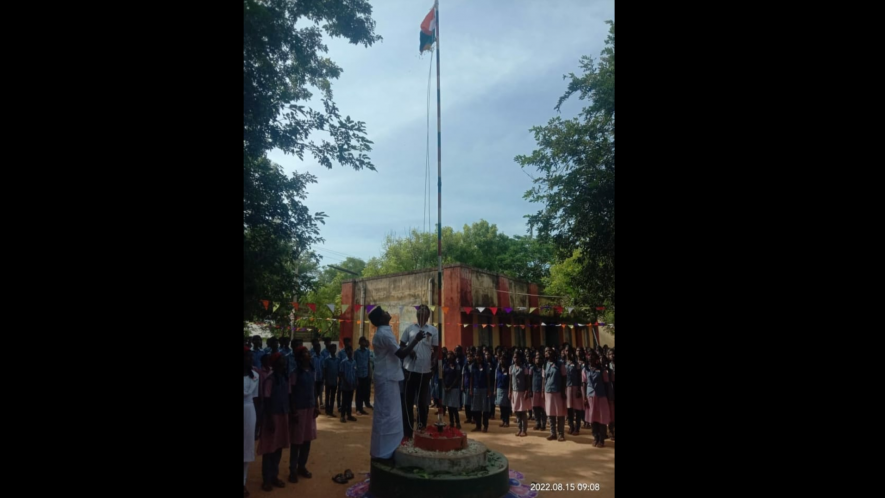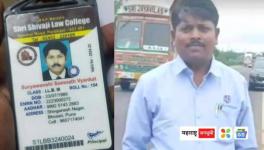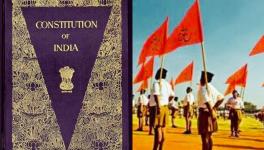Many Dalit Village Panchayat Presidents Hoist National Flag for the First Time

Suresh Kannan, Manjanviduthi Panchayat President hoisting the national flag. Image courtesy: Samuel Raaj
Intervention by the Tamil Nadu Untouchability Eradication Front (TNUEF) was successful as nineteen dalit panchayat presidents hoisted the national flag for the first time on August 15, the 76th Independence Day.
At the Senthangudi village in the Pudukkottai district, caste Hindus prevented the dalit Panchayat President from hoisting the national flag at the Keezhaiyur government school.
According to a TNUEF survey report released on August 11, in 20 village panchayats, dalit presidents were not allowed to hoist the national flag.
Following the report, Tamil Nadu Chief Secretary V Irai Anbu wrote to all the district collectors in the state. He asked them to ensure that no elected leader of any local body is prevented from hoisting the national flag on Independence Day on the grounds of caste.
TNUEF’S ACTIVE INTERVENTION
After the report's release, TNUEF followed up on the 20 village panchayats where the Scheduled Caste presidents were not allowed to hoist the flag.
Pudukkottai District Manjanviduthi Panchayat President Suresh Kannan hoisted the national flag for the first time with state protection.
“Even the superintendent of police (SP) was present at the venue to prevent untoward activities,” said Chellakannu, President of TNUEF.
In Vadakuchipalayam village, Vikravandi Block in Villupuram District, the gram sabha secretary, who belongs to an MBC community, tried to prevent Kaliyaperumal, Scheduled Caste panchayat president, from hoisting the flag.
“The gram sabha secretary said there was no flag pole in the village; thereby, he cannot hoist the flag. But, higher authorities intervened and ensured Independence Day was celebrated without any hassle,” said Sankaran, TNUEF leader in Villupuram.
He added, “the circular sent by TNUEF has been very fruitful. The government immediately acted on it”.
Speaking to NewsClick, Samuel Raaj, general secretary of the TNUEF, said, “upon the findings of the survey, we proactively intervened to prevent caste-based discrimination against the civic body presidents with hoisting the national flag.”
DALIT CHIEF ‘INSULTED’
In the Pudukkottai district, the Senthangudi village panchayat president Tamizharasan could not hoist the flag at the Keezhaiyur Government High School.
“Upon pressure from caste Hindus, the Headmaster (HM) of the school requested the panchayat President not to hoist the national flag in the government school,” said President of TNUEF Chellakannu to NewsClick.
He further said, “As soon as we got the information, we intervened; we met the Alangudi Tehsildar and urged him to ensure that the chief hoists the flag. But, he said, ‘there is no norm that the Panchayat chief has to hoist the national flag in the neighbourhood government school’.”
However, it has been the practice for the Panchayat President to hoist the national flag on Independence Day at the Keezhaiyur government school.
“We demanded the Tehsildar to give it to us in writing that there is no such norm, but he refused to do so,” said Chellakannu.
“The HM invited the Panchayat President to the school on Independence Day, but the HM himself hoisted the flag and insulted the President”, he added.
The TNUEF has urged action against the HM and the caste Hindus who were behind the discriminatory act.
TNUEF SURVEY
The TNUEF survey was carried out in 24 districts, covering 386 village panchayats. It was based on a questionnaire and was implemented by 400 trained volunteers.
According to the survey, in 22 village panchayats, dalit presidents were not allowed to sit on chairs, while in 42 panchayats, they were not allowed to have a name board. It also said that dalit presidents were not allowed to function independently.
The survey pointed out that in 17 panchayats, women dalit presidents were facing gender discrimination. Other issues highlighted include attacks/threats faced, disrespect, and bias shown by Union Councillors and government officials.
Get the latest reports & analysis with people's perspective on Protests, movements & deep analytical videos, discussions of the current affairs in your Telegram app. Subscribe to NewsClick's Telegram channel & get Real-Time updates on stories, as they get published on our website.
























